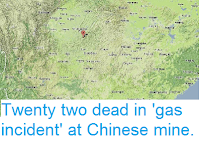Thirty three miners have been confirmed dead following a gas explosion at a coal mine in Inner Mongolia, China, on Saturday 3 December 2016. The incident happened at about midday, local time, at the Chifeng Baoma mine in Chifeng (or Ullanhad) in the southeast of the province. Over a hundred and thirty men were bellow ground at the time of the incident, the majority of whom were able to escape. Thirty three miners were unaccounted for following this initial evacuation, all of whom were later found dead by rescue teams.
Rescue workers entering the Chifeng Baoma mine in Inner Mongolia on Sunday 4 December 2016. Lian Shen/Xinhau/AP.
Coal is formed when buried organic material, principally wood, in heated
and pressurised, forcing off hydrogen and oxygen (i.e. water) and
leaving more-or-less pure carbon. Methane is formed by the decay of
organic material within the coal. There is typically little pore-space
within coal, but the methane can be trapped in a liquid form under
pressure. Some countries have started to extract this gas as a fuel in
its own right. When this pressure is released suddenly, as by mining
activity, then the methane turns back to a gas, expanding rapidly
causing, an explosion. This is a bit like the pressure being released on
a carbonated drink; the term 'explosion' does not necessarily imply
fire in this context, although as methane is flammable this is quite
likely.
Coal is also comprised more or less of pure carbon, and therefore reacts
freely with oxygen (particularly when in dust form), to create carbon
dioxide and (more-deadly) carbon dioxide, while at the same time
depleting the supply of oxygen. This means that subterranean coal mines
need good ventilation systems, and that fatalities can occur if these
break down.
See also...
Follow Sciency Thoughts on Facebook.







